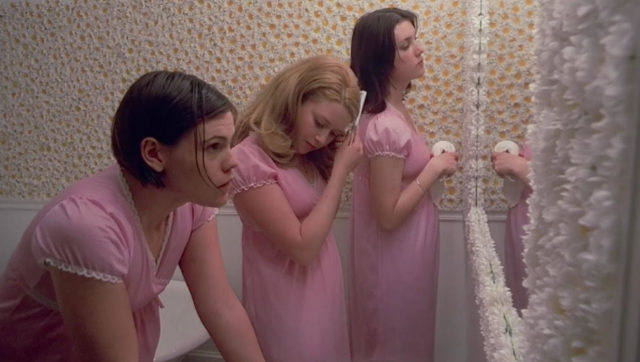
Megan Bloomfield (Natasha Lyonne) is the all-American girl next door. She’s bubbly and perky, lives in the suburbs with her parents and is dating Jared (Brandt Wille), the high school football star. He’s a John Travolta look-a-like with the hair to match, and Megan likes him. Or, at least she’s convinced herself she does. She doesn’t like kissing him much, but to be fair, kissing Jared is a lot like making out with the Rolling Stones logo.
Megan’s first love is cheerleading. And cheerleaders. She also likes the music of Melissa Etheridge and the taste of tofu. Those last two land her in hot water with her family and friends. You’re a homosexual, they tell her. But I’m a cheerleader, Megan retorts. Not good enough, and off she goes to True Directions, a conversion camp where founder Mary Brown (Cathy Moriarty) assures Megan’s parents that she can cure their daughter of her lesbian urges in five simple steps.
Written by Brian Wayne Peterson and directed by Jamie Babbit, But I’m a Cheerleader is an intentionally artificial romantic-comedy with a touch of memoir. True Directions is loosely based on a similar camp Babbit’s mother used to run for kids with drug and alcohol problems. The movie version is much more comedic, with Brown promising 100% conversion to Megan’s parents despite the presence of a home just beyond the campground run by a gay couple offering sanctuary from True Directions.
That couple, played by Wesley Mann and Richard Moll, are humorous, if not stereotypical. But I’m a Cheerleader is loaded with stereotypes, most of them ripe for subversion. While at True Directions, Megan is given all-pink outfits: pink blouse, pink skirt, pink shoes. All the girls are. The rooms are painted entirely pink, even the props and furniture — each one the same shade of pink. The boys get the same treatment, only blue. Cinematographer Jules Labarthe gives these sets a garish look with flat, artificial lighting, further accentuating the absurdity of the situation.
Toss in some wonderfully cartoonish scenes and RuPaul as a counselor wearing spectacularly short shorts and a “Straight is Great” T-shirt, and you have all the fixings for a commercial flop and a cult classic. The mainstream critical consensus in 2000 was mixed to negative, while the gay media picked up on Babbit and Peterson’s deliberate campiness.
If But I’m a Cheerleader suffers from anything, it’s that much has changed in general awareness since its release in 2000. Cinematic depiction of conversion therapy camps (The Miseducation of Cameron Post and Boy Erased to name two from 2018 alone) are both sinister and fraught with emotion. These movies have their moments, but they also come burdened with capital-I Importance; the kind sympathetic audiences need to feel a connection with something and someone outside of themselves.
But I’m a Cheerleader delightfully eschews that notion. It stands its ground and has fun while poking fun. Because of that, it’s become a mainstay of queer cinema for the past 20 years.
More on what to stream for Pride Month, this Friday on Metro Arts on KGNU, 3 p.m. (88.5 FM, 1390 AM and online at kgnu.org).














